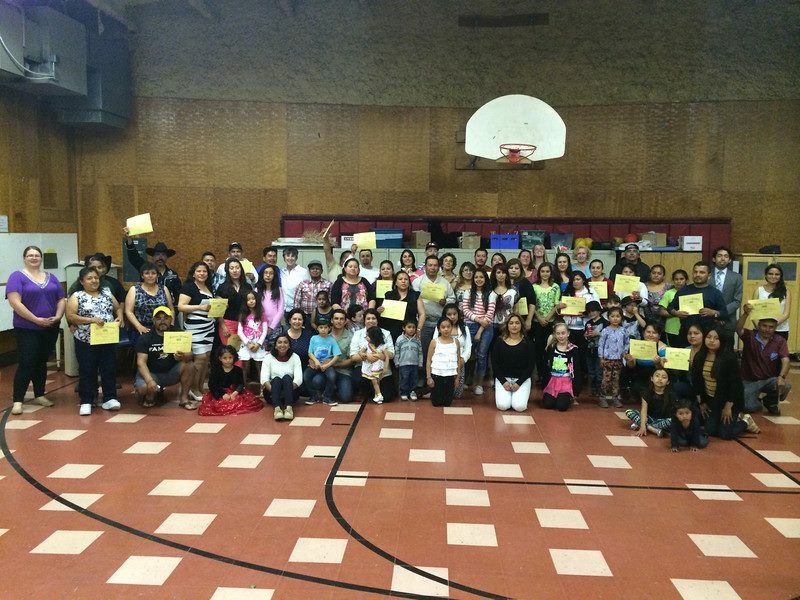Elvira Jimenez gets nervous before going to work. Bussing tables at Duarte’s Tavern isn’t what sets her heart pounding each morning, however. It’s speaking English to the customers. What if she misunderstands, and brings a patron something they don’t want?
She practices the English in her head, and practices saying each sentence aloud: “Excuse me, can I take your plate?” “More water?” “Your waitress is coming.” But sometimes, in spite of all her work, the words still come out wrong.
“I give customers water and bread. But I want to have a conversation with them. It’s hard when someone asks, ‘How is this cooked? Is this good?’ and I want to answer them,” Jimenez says. “I know a lot of words but I don’t know how to put them together.”
She’s getting there. After four years of taking ESL classes at Puente without a single break (starting as a beginner and ending up in the most advanced class, before deciding to step down a level to take it slow), Jimenez clearly understands much of the spoken English that surrounds her and can offer limited replies. It’s hard work – very hard.
“Right now it’s not comfortable. I try tell myself I can do it, but I still feel that pressure,” she says.
Learning English is one thing. Gaining confidence is another. Jimenez, a spry, earnest woman in her early thirties, started as a dishwasher at Duarte’s 12 years ago as a newcomer to Pescadero and a newlywed as well, having followed her husband to California from Mexico. Dishwashing, which is still part of her job at the restaurant, was really rough – sweaty eight-hour shifts scrubbing greasy pans, silverware and sticky soup tureens. She never wore gloves.
“When I started, the hot water burned me. My hands would start to peel,” she recalls. But at least she didn’t need to speak English – or speak much at all.
Then, a few years ago, her boss told her that she wanted Jimenez to start bussing dishes a few nights a week. Although she would earn slightly more and take home some tips, Jimenez found the prospect terrifying. But she also wanted to give it a try.
“She would tell me: ‘You can do it. You’re just going to take bread and water to them. You don't have to be scared. We believe in you,’” Jimenez remembers.
Soon, Jimenez had English teachers everywhere. At Puente, she doubled down on her ESL work. At Duarte’s, her co-workers were told to speak to her in English only. It increased her comprehension but also her anxiety level.
Her most unexpected teacher is her 5-year-old daughter, Brianna, who comes home from school chattering away in English and then switches to Spanish so her mom and dad can speak to her. Brianna also attends Puente’s Homework Club from time to time, on evenings when her mom is taking ESL.

Brianna is the reason Jimenez enrolled in ESL in the first place. She wanted to be able to know what her daughter was saying, to help her with her homework, and to be a part of her world.
“It’s very important for every parent to understand their children, to speak their language,” says Jimenez. “When my child says, ‘Can you read me a book?’ I want to be able to read both in English and Spanish to her.”
It was a good decision, because Brianna is already precocious enough to read on her own, much to her mother’s delight. And Brianna has even started improving her mother’s English.
“My daughter tells me, ‘Mommy, you’re reading it wrong.’ She’ll read words to me like ‘apple,’ and if I’m not saying the words correctly she’ll correct me. She says, “Look at my lips and how I move them: apple.’”
Most Americans, especially white Americans, believe immigrants ought to “learn English.” But few Americans – just 18 percent – have themselves faced the challenge of learning a second language. That’s hard enough to do on its own, let alone while living in a foreign country, as Jimenez and an overwhelming number of other U.S. immigrants have done.
Puente offers ESL classes on Tuesdays and Thursdays from 7-9 pm taught by teachers who are committed to teaching conversation-based classes. Jimenez joins over 50 students in adult education and ESL classes who are balancing working and studying on the South Coast each week.
Jimenez has learned a lot of skills at work. When she isn’t washing dishes or bussing tables, she makes pies, prepares artichokes and cuts fish. Her husband is a cook at Duarte’s and they work opposite shifts, which is hard on their little family. But Jimenez is determined to make it work.
The English is the hardest part. Even after her shift ends, she’ll suddenly remember a word she forgot that day, and kick herself.
“At the beginning I thought, ‘I’m never going to learn this.’ But you keep coming to classes and the words tend to stick. You have to fight, day by day.”
